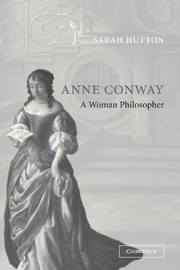Book contents
- Frontmatter
- Contents
- Acknowledgements
- Introduction
- 1 Anne Finch, Viscountess Conway
- 2 A philosophical education
- 3 Religion and Anne Conway
- 4 Anne Conway and Henry More
- 5 John Finch, Thomas Hobbes and Margaret Cavendish
- 6 Experimental physick: Boyle, Greatrakes, Stubbe
- 7 Physic and philosophy: Van Helmont, father and son
- 8 Kabbalistical dialogues
- 9 Quakerism and George Keith
- 10 Last years
- 11 Legacy
- Bibliography
- Index
6 - Experimental physick: Boyle, Greatrakes, Stubbe
Published online by Cambridge University Press: 22 September 2009
- Frontmatter
- Contents
- Acknowledgements
- Introduction
- 1 Anne Finch, Viscountess Conway
- 2 A philosophical education
- 3 Religion and Anne Conway
- 4 Anne Conway and Henry More
- 5 John Finch, Thomas Hobbes and Margaret Cavendish
- 6 Experimental physick: Boyle, Greatrakes, Stubbe
- 7 Physic and philosophy: Van Helmont, father and son
- 8 Kabbalistical dialogues
- 9 Quakerism and George Keith
- 10 Last years
- 11 Legacy
- Bibliography
- Index
Summary
For most of her life Anne Conway was afflicted by debilitating chronic illness for which no cure or palliative could be found. The crippling pain visited on her by her condition was an inescapable fact of her daily existence, and attempts to alleviate her suffering dominated her life. One consequence of this was that she had more than average contact with medical men. As we shall see, it was through events supervening upon her consultation of the Irish healer, Valentine Greatrakes, that she became a front-row spectator of the debates about method and interpretation occasioned by the experimentalism of Robert Boyle (1627–91) and his defenders in the Royal Society. In this chapter I shall discuss links between Anne Conway's medical history and contemporary debates about theoretical and methodological issues. I shall also discuss some of the metaphysical issues raised by the competing explanatory claims of those who attempted to interpret natural phenomena, especially in the context of medicine.
Anne Conway's personal experience of unrelievable pain certainly impinges directly on her philosophy. It is more than likely that her own incontrovertible experience of bodily pain affecting her mind contributes to her refutation of mind–body dualism in the passage in her Principles where she asks,
Why does the spirit or soul suffer so with bodily pain? For if when united to the body it has no corporeality or bodily nature, why is it wounded or grieved when the body is wounded, whose nature is so different? … But if one admits …
- Type
- Chapter
- Information
- Anne ConwayA Woman Philosopher, pp. 116 - 139Publisher: Cambridge University PressPrint publication year: 2004



